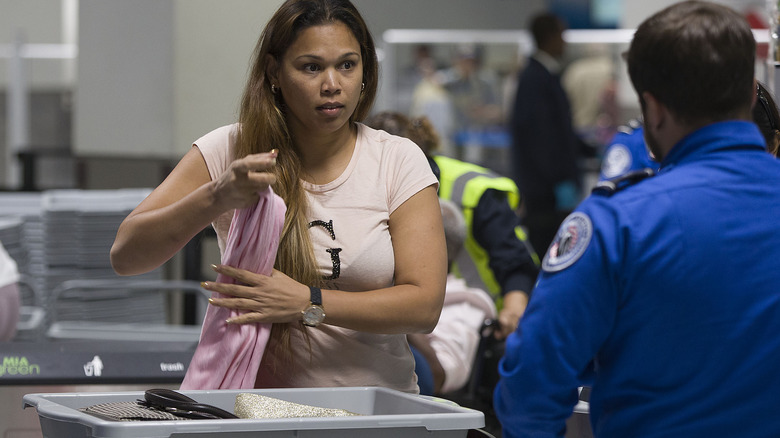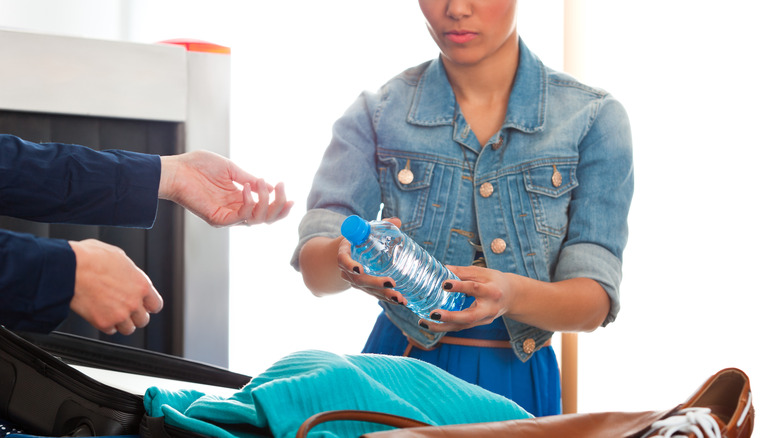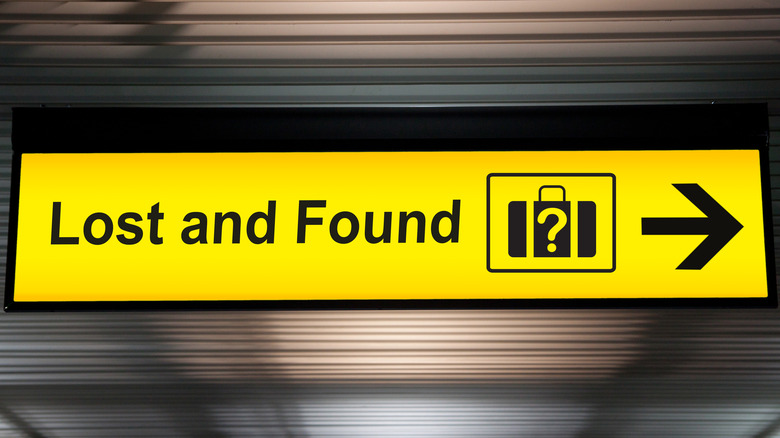What The TSA Does With Your Confiscated Items (And How You Can Get Them Back)
Flying is a form of travel that inevitably comes with plenty of rules and regulations in place. Designed to keep passengers and airline employees safe and sound in the skies, safety inspections begin on the ground long before departure and are enforced by the Transportation Security Administration (TSA). Even if you're well aware of what's officially allowed or prohibited onboard an aircraft, there's always a chance that you make a misstep and pack something in your carry-on that gets confiscated.
Prohibited items like flammables, hazardous materials, and loaded firearms seem like fairly obvious items to keep far from your luggage. However, it's things like certain souvenirs and oversized water bottles that can trip travelers up. Some items regularly confiscated by TSA include keychain knives, pocket knives, and shampoo or sunscreen in bottles that exceed 3.4 ounces. When these items are found by a TSA agent, they're quickly removed.
If this happens, travelers aren't out of options. It's important to keep in mind when a TSA agent removes an item, it doesn't mean you can't get it back. You always have the option of returning to the main check-in counter to place items with your checked luggage if you have enough time to do so before your flight. If you parked at the airport and the item can't be onboard, you can pack it away in your vehicle for safekeeping before returning to the security line.
Where your items may end up
Before you decide to surrender your confiscated item to the TSA, be sure to check for a mailing station. Many airports now have these set up near security so travelers can mail items back home instead of abandoning them. The TSA does follow a policy of throwing out all prohibited liquids because they have no way of proving they haven't been compromised.
When you leave a confiscated item behind with the TSA, it automatically becomes government property. The guidelines airports follow for either disposing of, holding, or moving the item along to another service area are determined by the U.S. General Services Administration. Depending on the confiscated items in question, some are donated to local non-profits and schools.
Many confiscated items like toiletries and liquids are disposed of through paid contractors that work directly with airports. When illegal items are confiscated like weapons, drugs, or other prohibited substances, local law enforcement is tasked with handling those items. Beyond these scenarios, a vast majority of benign confiscated items end up for sale.
There are contracts created between certain airports and local surplus agencies for exactly this situation. Confiscated items that aren't disposed of and can't be donated are frequently sent to this type of marketplace where they are available to purchase by the public. While it may be a long shot, there's a chance you could retrieve your confiscated item by searching state surplus sales through GovDeals or the seized and surplus property page.
Retrieving items left behind
Fortunately for passengers, the TSA doesn't technically consider every item in their possession confiscated. In fact, if you happen to forget something like your phone or laptop in the security bin as you rush to find your gate, you typically have a significant window of time in which you can retrieve it. The TSA estimates anywhere from 90,000 to 100,000 items fall into this category monthly. While moving through security, when passengers forget a personal item that isn't prohibited, it's sent to a designated airport lost and found.
In most cases, you have 30 days to recover your lost item. Contacting the airport lost and found department directly is the quickest route to getting the item back that you've left at a security checkpoint. You'll be asked to list the item, state when it was lost, and reference identifying features like the color, size, or brand before you'll be allowed to pick it up or have it returned.
Understanding what the TSA does with confiscated items, and knowing you can potentially retrieve them, can bring some well-deserved peace of mind to your journey. While you'll likely want to just let that water bottle go, items with sentimental value or higher price tags aren't always a lost cause. In any event, do be sure to keep up to date on what's prohibited before you start packing to avoid the scenario altogether.


